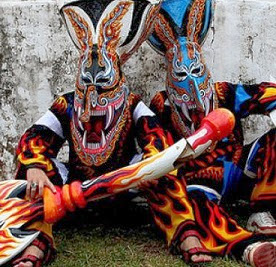It's a small town with a folk museum and a famous pagoda, but not much else to draw tourists away from Bangkok and Pattaya. Except for the Phi Ta Khon Festival ("Ghosts with Human Eyes"), held every year at different times depending on the spiritual conditions (in 2014, on the weekend of June 27th).
It commemorates an event in the life of the Buddha's last incarnation, Prince Vessantara. He fell asleep, and his followers thought he was dead. They decided to celebrate his escape from samsara, and made so much noise that he woke "from the dead."
The festival begins begins with a Buddhist ceremony that invokes guardian spirits, followed by a procession of the men in the village, nude except for rice-husk loincloths, covered with river mud, waving giant wooden phalluses of various sizes and shapes.
The male spectators wave phallic charms (paladkik) or giant phalluses of their own, inscribed with characters meaning "Big Man." Apparently guardian spirits likes penises.
On the second day, there's another parade (Hae), with more semi-nude men, but generally more elaborate costumes of ghosts and monsters, with ornate masks. Crossdressing is common. As are penises so large that they're hard to carry.
There are prizes for the best costumes and dances. Plus phallic rockets (Bangfai Ko) and partying all night.
The third day is devoted to Buddhist sermons, prayer and meditation.








